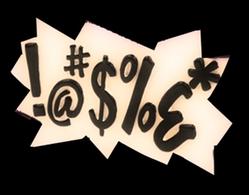 Whatever happened to the Clean Reader app ("Read books, not profanity")? It launched in 2015 as the "only e-reader that blocks profanity in books from being displayed on your screen. You decide how clean your books will be." Authors were understandably displeased by its mission. Clean Reader's Facebook and Twitter accounts haven't been updated since 2016.
Whatever happened to the Clean Reader app ("Read books, not profanity")? It launched in 2015 as the "only e-reader that blocks profanity in books from being displayed on your screen. You decide how clean your books will be." Authors were understandably displeased by its mission. Clean Reader's Facebook and Twitter accounts haven't been updated since 2016.
I thought about Clean Reader when I saw BookNet Canada's recent study of the large number of bestselling Self-Help books that have a swear word in the title, including four of the top 10 books in that category during one week in August.
"Is this a new thing?" BookNet Canada wondered, and then did what it does best--"use SalesData to dig deeper and investigate the history of Self-Help print books with swear words in the title to see whether there has actually been an increase over the past couple of years."
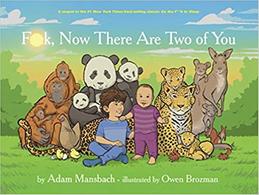 Of course, we know this is not a new thing. Justin Halpern's Sh*t My Dad Says was a bestseller almost a decade ago. This week I received an e-mail from Akashic Books promoting F**K, Now There Are Two of You, the third installment in Adam Mansbach's series that includes You Have to F**king Eat and the one that started it all in 2014, Go the F**k to Sleep.
Of course, we know this is not a new thing. Justin Halpern's Sh*t My Dad Says was a bestseller almost a decade ago. This week I received an e-mail from Akashic Books promoting F**K, Now There Are Two of You, the third installment in Adam Mansbach's series that includes You Have to F**king Eat and the one that started it all in 2014, Go the F**k to Sleep.
So, how many Self-Help books have a swear word in the title? Many. They are often semi-redacted by keyboard symbols, the asterisk being a particular favorite. I don't really care either way. Swear or redact, it's up to you, though admittedly there are equally profane terms I would consider redacting, such as P#*pkin Sp*ce or R*@lity TV.
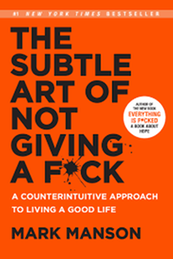 In any case, let's see what BookNet Canada found: "Looking at print unit sales in the Canadian English-language trade book market, we pulled the 100 top-selling ISBNs with the BISAC subject code Self-Help for each year from 2016 to the end of June 2019. We looked at those four lists and, for each year, counted how many titles had some sort of swear word, or swear-adjacent word like 'sh*t,' 'badass,' 'bleep,' or grawlixes (e.g., #@%!)."
In any case, let's see what BookNet Canada found: "Looking at print unit sales in the Canadian English-language trade book market, we pulled the 100 top-selling ISBNs with the BISAC subject code Self-Help for each year from 2016 to the end of June 2019. We looked at those four lists and, for each year, counted how many titles had some sort of swear word, or swear-adjacent word like 'sh*t,' 'badass,' 'bleep,' or grawlixes (e.g., #@%!)."
Confession: I did not know the word "grawlix" existed before reading this. Now it's my favorite word.
BookNet Canada discovered that of the 400 top-selling ISBNs, only 42 had swear words in the title (11%), with a significant jump from 2016 to 2017, a slight increase from 2017 to 2018, and another large increase from 2018 to the first six months of 2019.
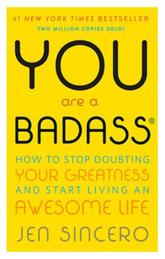 Analyzing the bestselling titles, BookNet Canada "realized that many of them were reappearing on the lists from year to year. When we removed duplicate ISBNs from the list of 400 bestsellers, we found that there were 21 unique ISBNs accounting for all instances of books with swear words in their titles."
Analyzing the bestselling titles, BookNet Canada "realized that many of them were reappearing on the lists from year to year. When we removed duplicate ISBNs from the list of 400 bestsellers, we found that there were 21 unique ISBNs accounting for all instances of books with swear words in their titles."
Two thirds (71%) were among the 100 bestselling Self-Help books the same year they were published. During the period studied, the 21 top-selling Self-Help ISBNs with a swear word in the title included four each for Mark (The Subtle Art of Not Giving a F*ck) Manson and Jen (You Are a Badass) Sincero; three for Gary (Unfu*k Yourself) John Bishop; and two for Sarah (Calm the F*ck Down) Knight. Among the rest were foul-mouthed classics like Where's My F**king Unicorn? by Michelle Gordon, The French Art of Not Giving a Sh*t by Fabrice Midal and I Used to Be a Miserable F*ck by John Kim.
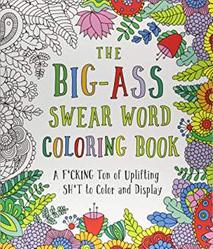 And that's just the Self-Help category! Even a cursory (see what I did there?) browse through other bookstore sections will reveal titles like What the F*@# Should I Make for Dinner?; Thug Kitchen: Eat Like You Give a F*ck; The F*ck It Diet: Eating Should Be Easy; The Big-Ass Swear Word Coloring Book: A F*cking Ton of Uplifting Sh*t to Color and Display; The Girl Who Could Move Sh*t with Her Mind; and Tidy the F*ck Up: The American Art of Organizing Your Sh*t.
And that's just the Self-Help category! Even a cursory (see what I did there?) browse through other bookstore sections will reveal titles like What the F*@# Should I Make for Dinner?; Thug Kitchen: Eat Like You Give a F*ck; The F*ck It Diet: Eating Should Be Easy; The Big-Ass Swear Word Coloring Book: A F*cking Ton of Uplifting Sh*t to Color and Display; The Girl Who Could Move Sh*t with Her Mind; and Tidy the F*ck Up: The American Art of Organizing Your Sh*t.
Exploring whether Self-Help books with a title obscenity or two sell better, BookNet Canada pulled a new list of the 100 bestselling ISBNs from 2016 to the end of June 2019 and found that "sales for the bestselling Self-Help books with a swear word in the title made up a large percentage of sales, especially given their small numbers. Though books with a swear word in the title made up only 14% of the top 100 ISBNs, they accounted for 48% of sales at their peak."
BookNet Canada concluded that "having a swear word, or swear-adjacent word, in the title of a Self-Help book is trending up. The 21 swear-word bestsellers... represent a sh*t ton of sales in the Self-Help category."
Since this is the 21st century--the f**king future, people!--I'm amazed that we still use grawlixes instead of emojis. I have no doubt that somewhere out there in a secret publishing industry R&D lab, word scientists are feverishly experimenting with that particular digital transition. For the moment, however, we'll just keep muddling along with * and # and @ and all their archaic friends. As Merriam-Webster says, "The grawlix: it's some good $#*!."

